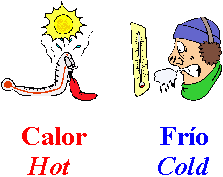
In
Spanish the seasons, days of the week and months of the year
are written in lower case and do not start with a capital
letter.


To
talk about the days of the week, use '
el'. To talk
about months and seasons, use '
en':
EL lunes / EN
enero / EN primavera
- El jueves tengo que estudiar. - I've got to
study on Thursday.
However, we use the verb 'ser' to associate a date to a day:
- El 1 de febrero
es miércoles.- The 1st of February is
Wednesday.
- En
diciembre
la ropa es más cara que en enero. - Clothes are more
expensive in December than in January.
- En España, en
verano hace calor y en invierno hace frío.- In
Spain, it's hot in the summer and cold in the winter.
Notice that we say POR
la mañana, POR la tarde, POR la noche
- En verano no puedo dormir
por las noches. - In the summer I can't sleep at
night.
 To
ask questions, use 'Cuando' - when (In the question
form, cuando is written with an accent - cuándo).
To
ask questions, use 'Cuando' - when (In the question
form, cuando is written with an accent - cuándo).